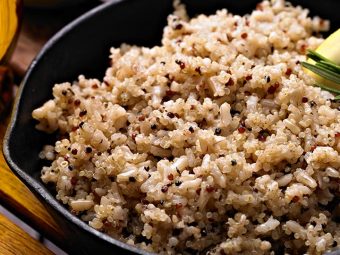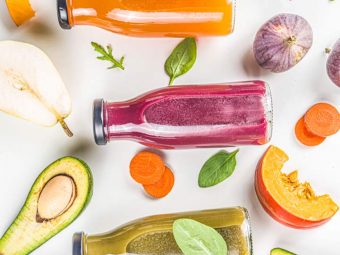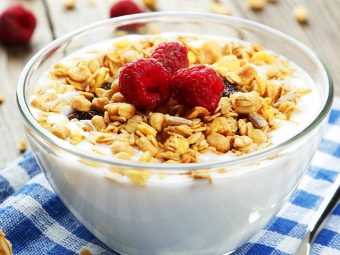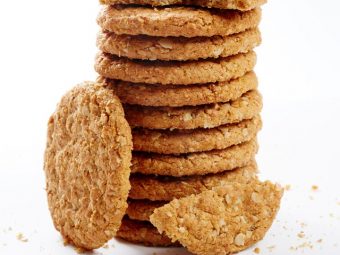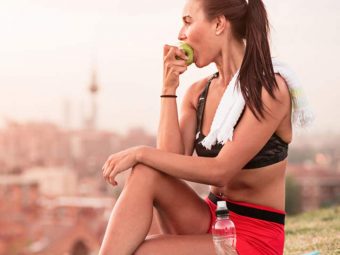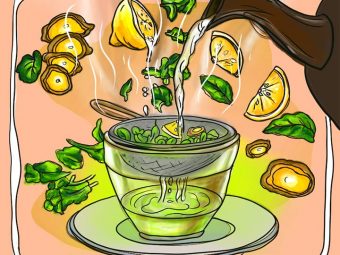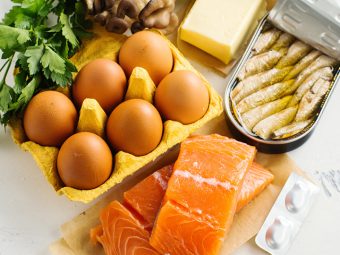25 Belly Fat Burning Foods To Eat For A Slim Waist
Lose some inches at the waist by loading up on fruits, pulses, fish, and greens.

Belly fat can be threatening to your health (1). This fat is linked with insulin resistance, heart disease, and diabetes (2) (3) and can be dangerous for people of any genetics and age. Understanding the severity of the situation, today, we introduce you to some belly fat-burning foods in this article. You will surely lead a healthy life with these foods in your diet. Scroll down for more info!
In This Article
25 Best Foods That Burn Belly Fat Fast
1. Fruits
Fruits are rich in vitamins, minerals, dietary fiber, and antioxidants (4). Dietary fiber improves digestion, increases the number and variety of good gut microbes, improves metabolism, and helps lower blood pressure (5).
Citrus fruits like orange, lemon, kiwi, tangerine, and fresh limes are good sources of antioxidants and have antimicrobial properties (6), (7).
Other fat-burning fruits include apples, watermelons, grapes, and strawberries (8), (9), (10). However, make sure not to overdo it with fruits. Even though they contain lots of vitamins and minerals, they also contain sugar.
2. Pulses
Pulses (or dal ) are protein-rich and low in calories and fat. The lean protein present in pulses helps build lean muscle mass, speeds up metabolism, and improves overall body function (11). Simply boiled dal is healthier than fried or spiced up dal.
3. Fish
Fish are great sources of protein and omega-3 fatty acids (12). Proteins help build muscle, and omega-3 fatty acids reduce inflammation in the body and increase metabolic rate (13), (14). Also, the lower the inflammation, the lower the chances of gaining weight that is triggered by stress and inflammation.
4. Almonds
Almonds keep your stomach full for a long time due to their healthy fat and protein content. They are good sources of nutrients for vegetarians to burn fat. They are also rich in omega-3 fatty acids that increase energy and metabolism (15).
5. Beans And Legumes
Beans and legumes are good sources of protein, fiber, vitamins, and minerals. Consuming them regularly can help suppress hunger pangs, thereby preventing overeating. They are also great sources of protein for vegans and vegetarians. Try to mix three different legumes to provide your body with different micronutrients (16), (17).
6. Spinach And Other Green Vegetables
Vegetables like spinach, kale, collard greens, radish greens, carrot, broccoli, and turnip are rich in vitamins, minerals, antioxidants, and dietary fiber (18), (19). These vegetables can help reduce belly fat by increasing satiety, reducing inflammation, and aiding digestion (20), (21).
7. Dairy Products
Full-fat dairy products are recommended as they are loaded with nutrients and can keep you satiated for a long duration, thereby aiding weight loss (22). Slim or skimmed milk is devoid of these nutrients and does not keep your hunger pangs at bay as effectively as full-fat dairy products.
8. Oatmeal
Oats are rich in fiber and aid digestion. They contain insoluble fiber and carbohydrates that curb your hunger and give you energy for your workout (23). Eat oatmeal in the morning with some nut butter or nuts for added protein. When buying oatmeal, make sure that you choose one that is flavorless as flavored oats contain sugar and chemicals.
9. Peanut Butter
Peanut butter is a great option to sweeten your breakfast or smoothies. The nut butter is loaded with protein, vitamin E, iron, potassium, zinc, antioxidants, dietary fiber, and polyphenols (24). Consume a handful of soaked or boiled peanuts as a snack to curb hunger pangs. Do not go overboard and consume too many peanuts as they are calorie-dense.
10. Extra Virgin Olive Oil
Cooking with extra virgin olive oil is good for weight loss and general health because it helps lower LDL (bad) cholesterol and increases the levels of HDL (good) cholesterol (25). It is a weight loss-friendly and heart-friendly oil that you can use to cook or season your food.
11. Whole Grains
Whole grains, such as millet, quinoa, and brown rice, are good sources of protein, vitamins, minerals, and dietary fiber (26). Consuming them can keep your hunger pangs at bay, aid digestion, and prevent constipation (27), (28), (29). This, in turn, can help you shed the belly fat easily.
12. Protein Powder
Protein powders are a great option if you cannot load up on whole foods that are rich in protein. You can take whey protein, vegan protein powder, or homemade protein powder to help improve muscle mass and increase your metabolism (30).
13. Chia Seeds
It has become a trend now to include chia seeds in smoothies, salads, and breakfast bowls. They are a great source of protein and healthy fats, and two tablespoons of chia seeds contain almost 10 grams of dietary fiber (31). Chia seeds are gluten-free, increase satiety, and have anti-inflammatory, anti-diabetic, antioxidant, and laxative properties (32).
14. Mushrooms
According to Kayleen St.John, R.D., Executive Director of Nutrition and Strategic Development of Euphebe, low levels of vitamin D are connected to abdominal obesity (33). Mushrooms are good sources of vitamin D (34). They are low in calories, high in protein and water content, and extremely delicious (35). You can easily prepare mushroom soup or add them to salads and sandwiches to make a delicious lunch or dinner without worrying about calories.
15. Raspberries
Raspberries are loaded with dietary fiber and polyphenols like anthocyanins and ellagitannins (36). The dietary fiber helps add bulk to the stool, improves bowel movement, and keeps you satiated for a long time (37), (38). The antioxidants in them help scavenge the harmful free oxygen radicals, thereby reducing inflammation and inflammation-induced obesity (39), (40). Consume raspberries in breakfast bowls or smoothies.
16. Coconut Oil
Virgin coconut oil increases good cholesterol (HDL cholesterol) levels (41). Use edible-grade coconut oil for cooking. You can also have bullet coffee as your morning drink to keep you charged the entire day.
Note: Talk to your physician before consuming coconut oil regularly.
17. Soup
According to Julieanna Hever, author of The Vegiterranean Diet, having soup before meals helps reduce the number of calories you consume. This, in turn, can help prevent fat accumulation in the belly region (42). You need to consume vegetables, chicken, or mushroom clear soup. Ideally, make soups at home to reap the maximum benefits.
18. Eggs
A study published in the International Journal of Obesity compared weight loss after an egg breakfast to that after a bagel breakfast containing similar calories. Participants who consumed two eggs for breakfast lost 65% more weight, and their waist circumference reduced by a whopping 34% (43). This is because eggs are a great source of protein and both water- and fat-soluble vitamins that help keep the hunger pangs at bay and build lean muscle.
19. Spicy Chili Peppers
Chili peppers like cayenne, green chili, and red chili are loaded with vitamin C and capsaicin that help increase the metabolic rate and insulin sensitivity and help burn fat (44). Add cayenne pepper or red chili flakes to your salads, and green chilis to fritters or omelet. They not only enhance the taste but can also help you lose weight.
20. Broccoli
From reducing obesity to reducing the risk of breast cancer, broccoli offers a wide range of benefits (45), (46). In fact, experts believe that consuming broccoli may improve insulin resistance in people with type 2 diabetes (47). The phytonutrients present in broccoli have the potential to flush out toxins, reduce inflammation, reduce the risk of cancer, and boost overall health (48). Consume blanched or grilled broccoli with salads and soups to reduce weight.
21. Nuts
Nuts like walnuts, macadamia nuts, pine nuts, and pistachios are good for weight loss. They are loaded with healthy fats and protein that increase your satiety levels, improve the taste of food, and prevent you from snacking on other trans fat-loaded junk food. Regular consumption of nuts helps prevent obesity and the risk of type 2 diabetes (49).
22. Farro
Farro or emmer is a wheat product that is dried and sold. It can be consumed after cooking in water and adding to soups and salads. It is high in dietary fiber, iron, and calcium, and low in sodium (50). Dietary fiber keeps you satiated for a long duration and cleanses the colon by improving bowel movement and preventing constipation(5). Consume farro for breakfast, lunch, or dinner, and you will notice the difference in your hunger cycle immediately.
23. Yogurt
Yogurt is loaded with good gut bacteria that aid digestion and take care of your gut health (51). In a study published in the British Journal of Nutrition, scientists found that women who consumed probiotics lost twice as much weight compared to those who did not (52). Include yogurt in your diet by using it to make smoothies and salad dressing.
24. Sauerkraut
Sauerkraut is a fermented food. Kimchi (pickled vegetables) is a good source of probiotics or good gut bacteria that help reduce bloating and improve digestion. According to Frank Lipman, M.D., founder of Eleven Eleven Wellness Center in New York City, including sauerkraut in your diet can help protect your gut from being overtaken by pathogenic bacteria that cause health problems (53). Hence, have some lip-smacking kimchi or sauerkraut to lose weight.
25. Spirulina
Spirulina is a low-calorie, protein-rich, anti-inflammatory, immuno-stimulating, blood lipid-lowering, and blood pressure-lowering single-cell protein (54). Include it in your diet after consulting your doctor. You can add it to salads, smoothies, and juices.
These are the 25 belly fat-burning foods you may include in your diet. But have you ever wondered why fat accumulates in your belly? Here’s why.
[ Read: Top 15 Drinks That Help You Lose Weight]
Why Does Fat Accumulate Around Your Belly?
- Hormonal Changes
Hormones play a major role in determining fat distribution in the body. Hormonal imbalance can lead to increased hunger, slow metabolism, and increased stress levels, leading to belly fat accumulation (55).
- Genes
If obesity runs in your genes, you may be more prone to accumulating fat in your belly region (56).
- Stress
Stress can increase your risk of accumulating belly fat through increased cortisol levels or increasing your food consumption (57).
- Lack Of Sleep
Sleep deprivation increases the production of stress hormones in the body, which can lead to overall weight gain (58).
- Sugary Foods And Beverages
Sugary foods and beverages are devils in disguise. They contain high amounts of additives, preservatives, and artificial colors, which are major contributors to belly fat (59).
- Alcohol
Alcohol is broken down into sugar in the body, and the excess sugar gets converted to fat. Excess sugar from alcohol can also lead to inflammation and inflammation-induced abdominal obesity (60).
- Trans Fats
Trans fats are unhealthy fats found in processed and fried foods. They tend to accumulate fat in the belly region and slow down fat metabolism (61).
- Inactivity
Being inactive can also lead to the accumulation of belly fat (62). A sedentary lifestyle is a primary reason for the increase in the incidence of obesity worldwide. Desk jobs, sitcoms, and lethargy are pushing people more and more toward obesity and obesity-related diseases.
- Low-Protein Diets
Being on a low-protein diet can also be harmful when it comes to losing belly fat. Lack of protein in your diet can lead to high stress and inflammation, increased toxicity, and slow metabolism (63).
- Menopause
Women who are going through menopause experience hormonal changes. High levels of cortisol (or the stress hormone) can be responsible for women gaining belly fat during this period (64).
- Low-Fiber Diets
Low-fiber diets can lead to weight gain, especially in the belly region (65). Low-fiber foods include white rice, flour, and peeled fruits. Dietary fiber helps increase satiety and aids stool movement in the colon, preventing the accumulation of belly fat (5).
But do not let these reasons deter you from shedding this dangerous type of fat. Here are some other things you can do to lose belly fat.
Other Things To Do To Lose Belly Fat
- Avoid packaged fruit juices, soda, and energy drinks.
- Have protein in every meal and snack.
- Reduce carbs in your diet.
- Consume foods rich in fiber, especially viscous fiber.
- Exercise is very effective in reducing belly fat. Hence, you should exercise regularly.
- Track your meals and figure out what and how much you are eating.
Stubborn belly fat may pose a risk to your overall health. It may result from hormonal imbalance, stress, genes, inactivity, menopause, alcohol, and lack of sleep. However, incorporating belly fat-burning foods into your diet may help reduce belly fat. These include fruits, pulses, fish, beans, almonds, green leafy vegetables, peanut butter, oatmeal, protein powder, whole grains, eggs, broccoli, and nuts. In addition, avoiding packaged fruit juices and regularly exercising can help manage belly fat effectively.
Sources
Articles on StyleCraze are backed by verified information from peer-reviewed and academic research papers, reputed organizations, research institutions, and medical associations to ensure accuracy and relevance. Read our editorial policy to learn more.
- Excess Fat Around the Waist May Increase Death Risk For Women, U.S. Department of Health & Human Sciences National Institutes of Health.
https://www.nih.gov/news-events/news-releases/excess-fat-around-waist-may-increase-death-risk-women - Abdominal obesity and the risk of all-cause, cardiovascular, and cancer mortality: sixteen years of follow-up in US women, Circulation, U.S. Library of Medicine, National Institutes of Health.
https://www.ncbi.nlm.nih.gov/pubmed/18362231 - Body Fat Distribution and Insulin Resistance, Nutrients, U.S. Library of Medicine, National Institutes of Health.
https://www.ncbi.nlm.nih.gov/pmc/articles/PMC3725490/ - Health Benefits of Fruits and Vegetables, Advances in nutrition, U.S. Library of Medicine, National Institutes of Health.
https://www.ncbi.nlm.nih.gov/pmc/articles/PMC3649719/ - Dietary fibre in foods: a review, Journal of food science and technology, U.S. Library of Medicine, National Institutes of Health.
https://www.ncbi.nlm.nih.gov/pmc/articles/PMC3614039/ - Phytochemical profile and antioxidant activity of physiological drop of citrus fruits, Journal of food science, U.S. Library of Medicine, National Institutes of Health.
https://www.ncbi.nlm.nih.gov/pubmed/23301602 - Phytochemical, antimicrobial, and antioxidant activities of different citrus juice concentrates, Food science & nutrition, U.S. Library of Medicine, National Institutes of Health.
https://www.ncbi.nlm.nih.gov/pmc/articles/PMC4708628/ - Weight loss associated with a daily intake of three apples or three pears among overweight women, Nutrition, U.S. Library of Medicine, National Institutes of Health.
https://www.ncbi.nlm.nih.gov/pubmed/12620529 - Effects of Dietary Strawberry Supplementation on Antioxidant Biomarkers in Obese Adults with Above Optimal Serum Lipids, Journal of nutrition and metabolism, U.S. Library of Medicine, National Institutes of Health.
https://www.ncbi.nlm.nih.gov/pmc/articles/PMC4939384/ - Effects of Fresh Watermelon Consumption on the Acute Satiety Response and Cardiometabolic Risk Factors in Overweight and Obese Adults, Nutrients, U.S. Library of Medicine, National Institutes of Health.
https://www.ncbi.nlm.nih.gov/pmc/articles/PMC6470521/ - Pulse Consumption, Satiety, and Weight Management, Advances in nutrition, U.S. Library of Medicine, National Institutes of Health.
https://www.ncbi.nlm.nih.gov/pmc/articles/PMC3042778/ - Nutrients in Fish and Possible Associations with Cardiovascular Disease Risk Factors in Metabolic Syndrome, Nutrients, U.S. Library of Medicine, National Institutes of Health.
https://www.ncbi.nlm.nih.gov/pmc/articles/PMC6073188/ - Dietary Protein and Muscle Mass: Translating Science to Application and Health Benefit, Nutrients, U.S. Library of Medicine, National Institutes of Health.
https://www.ncbi.nlm.nih.gov/pmc/articles/PMC6566799/ - Omega-3 Polyunsaturated Fatty Acids: Benefits and Endpoints in Sport, Nutrients, U.S. Library of Medicine, National Institutes of Health.
https://www.ncbi.nlm.nih.gov/pmc/articles/PMC6357022/ - The effects of daily intake timing of almond on the body composition and blood lipid profile of healthy adults, Nutrition research and practice, U.S. Library of Medicine, National Institutes of Health.
https://www.ncbi.nlm.nih.gov/pmc/articles/PMC5712498/ - Black Beans, Fiber, and Antioxidant Capacity Pilot Study: Examination of Whole Foods vs. Functional Components on Postprandial Metabolic, Oxidative Stress, and Inflammation in Adults with Metabolic Syndrome, Nutrients, U.S. Library of Medicine, National Institutes of Health.
https://www.ncbi.nlm.nih.gov/pmc/articles/PMC4555112/ - Nutritional quality of legumes, and their role in cardiometabolic risk prevention: a review, Journal of medicinal food, U.S. Library of Medicine, National Institutes of Health.
https://www.ncbi.nlm.nih.gov/pubmed/23398387 - Potential of commonly consumed green leafy vegetables for their antioxidant capacity and its linkage with the micronutrient profile, International journal of food sciences and nutrition, U.S. Library of Medicine, National Institutes of Health.
https://www.ncbi.nlm.nih.gov/pubmed/14522687 - Polyphenols from Root, Tubercles and Grains Cropped in Brazil: Chemical and Nutritional Characterization and Their Effects on Human Health and Diseases, Nutrients, U.S. Library of Medicine, National Institutes of Health.
https://www.ncbi.nlm.nih.gov/pmc/articles/PMC5622804/ - Dietary fiber and weight regulation, Nutrition reviews, U.S. Library of Medicine, National Institutes of Health.
https://www.ncbi.nlm.nih.gov/pubmed/11396693 - High intake of fruit and vegetables is related to low oxidative stress and inflammation in a group of patients with type 2 diabetes, Scandinavian journal of food & nutrition, U.S. Library of Medicine, National Institutes of Health.
https://www.ncbi.nlm.nih.gov/pmc/articles/PMC2606994/ - Full-fat dairy may reduce obesity risk, Harvard T.H. Chan School of Public Health.
https://www.hsph.harvard.edu/news/hsph-in-the-news/full-fat-dairy-may-reduce-obesity-risk/ - Dietary fiber and satiety: the effects of oats on satiety, Nutrition reviews, U.S. Library of Medicine, National Institutes of Health.
https://www.ncbi.nlm.nih.gov/pubmed/26724486 - Peanuts as functional food: a review, J Food Sci Technol, U.S. Library of Medicine, National Institutes of Health.
https://www.ncbi.nlm.nih.gov/pmc/articles/PMC4711439/ - Olive Oil Polyphenols Decrease LDL Concentrations and LDL Atherogenicity in Men in a Randomized Controlled Trial, The Journal of nutrition, U.S. Library of Medicine, National Institutes of Health.
https://www.ncbi.nlm.nih.gov/pmc/articles/PMC4516770/ - Whole Grains, FoodData Central, U.S. Department of Agriculture.
https://www.ncbi.nlm.nih.gov/pmc/articles/PMC5331584/ - Effects on satiation, satietAuthor information y and food intake of wholegrain and refined grain pasta, Appetite, U.S. Library of Medicine, National Institutes of Health.
https://www.ncbi.nlm.nih.gov/pubmed/27496788 - Whole Grains, The Nutrition Source, Harvard T.H. Chan School of Public Health.
https://www.hsph.harvard.edu/nutritionsource/what-should-you-eat/whole-grains/ - A Controlled, Randomized, Double-blind Trial to Evaluate the Effect of Vegetables and Whole Grain Powder That Is Rich in Dietary Fibers on Bowel Functions and Defecation in Constipated Young Adults, Journal of cancer prevention, U.S. Library of Medicine, National Institutes of Health.
https://www.ncbi.nlm.nih.gov/pmc/articles/PMC4384716/ - The effects of protein supplements on muscle mass, strength, and aerobic and anaerobic power in healthy adults: a systematic review, Sports medicine, U.S. Library of Medicine, National Institutes of Health.
https://www.ncbi.nlm.nih.gov/pubmed/25169440 - Seeds, chia seeds, dried, FoodData Central, U.S. Department of Agriculture.
https://fdc.nal.usda.gov/fdc-app.html#/food-details/170554/nutrients - Nutritional and therapeutic perspectives of Chia (Salvia hispanica L.): a review, Journal of food science and technology, U.S. Library of Medicine, National Institutes of Health.
https://www.ncbi.nlm.nih.gov/pmc/articles/PMC4926888/ - Vitamin D deficiency in relation to general and abdominal obesity among high educated adults, Eating and weight disorders : EWD, U.S. Library of Medicine, National Institutes of Health.
https://www.ncbi.nlm.nih.gov/pubmed/29856006 - A Review of Mushrooms as a Potential Source of Dietary Vitamin D, Nutrients, U.S. Library of Medicine, National Institutes of Health.
https://www.ncbi.nlm.nih.gov/pmc/articles/PMC6213178/ - Nutritional Analysis of Cultivated Mushrooms in Bangladesh – Pleurotus ostreatus, Pleurotus sajor-caju, Pleurotus florida and Calocybe indica, Microbiology, U.S. Library of Medicine, National Institutes of Health.
https://www.ncbi.nlm.nih.gov/pmc/articles/PMC3755200/ - Red Raspberries and Their Bioactive Polyphenols: Cardiometabolic and Neuronal Health Links, Advances in nutrition, U.S. Library of Medicine, National Institutes of Health.
https://www.ncbi.nlm.nih.gov/pmc/articles/PMC4717884/ - Effect of dietary fiber on constipation: A meta analysis, World journal of gastroenterology, U.S. Library of Medicine, National Institutes of Health.
https://www.ncbi.nlm.nih.gov/pmc/articles/PMC3544045/ - Dietary fiber and satiety: the effects of oats on satiety, Nutrition reviews, U.S. Library of Medicine, National Institutes of Health.
https://www.ncbi.nlm.nih.gov/pmc/articles/PMC4757923/ - Antioxidants and free radical scavengers for the treatment of stroke, traumatic brain injury and aging, Current medicinal chemistry, U.S. Library of Medicine, National Institutes of Health.
https://www.ncbi.nlm.nih.gov/pubmed/18288995 - Targeting inflammation-induced obesity and metabolic diseases by curcumin and other nutraceuticals, Annual review of nutrition, U.S. Library of Medicine, National Institutes of Health.
https://www.ncbi.nlm.nih.gov/pubmed/20420526 - Daily Consumption of Virgin Coconut Oil Increases High-Density Lipoprotein Cholesterol Levels in Healthy Volunteers: A Randomized Crossover Trial, Evidence-based complementary and alternative medicine : eCAM, U.S. Library of Medicine, National Institutes of Health.
https://www.ncbi.nlm.nih.gov/pmc/articles/PMC5745680/ - Soup preloads in a variety of forms reduce meal energy intake, Appetite, U.S. Library of Medicine, National Institutes of Health.
https://www.ncbi.nlm.nih.gov/pmc/articles/PMC2128765/ - Egg breakfast enhances weight loss, International Journal of Obesity.
https://www.nature.com/articles/ijo2008130?foxtrotcallback=true - Chili pepper as a body weight-loss food, International journal of food sciences and nutrition, U.S. Library of Medicine, National Institutes of Health.
https://www.ncbi.nlm.nih.gov/pubmed/27899046 - Effects of long-term consumption of broccoli sprouts on inflammatory markers in overweight subjects, Clinical nutrition : official journal of the European Society of Parenteral and Enteral Nutrition, U.S. Library of Medicine, National Institutes of Health.
https://www.ncbi.nlm.nih.gov/pubmed/29573889 - Temporal Efficacy of a Sulforaphane-Based Broccoli Sprout Diet in Prevention of Breast Cancer through Modulation of Epigenetic Mechanisms, Cancer prevention research, U.S. Library of Medicine, National Institutes of Health.
https://www.ncbi.nlm.nih.gov/pubmed/29764806 - Effect of broccoli sprouts on insulin resistance in type 2 diabetic patients: a randomized double-blind clinical trial, International journal of food sciences and nutrition, U.S. Library of Medicine, National Institutes of Health.
https://www.ncbi.nlm.nih.gov/pubmed/22537070 - Potential health benefits of broccoli- a chemico-biological overview, Mini reviews in medicinal chemistry, U.S. Library of Medicine, National Institutes of Health.
https://www.ncbi.nlm.nih.gov/pubmed/19519500 - Long-term associations of nut consumption with body weight and obesity, The American journal of clinical nutrition, U.S. Library of Medicine, National Institutes of Health.
https://www.ncbi.nlm.nih.gov/pmc/articles/PMC4144111/ - The nutrition and health benefits of yoghurt, International Journal of Dairy Technology, Wiley Online Library.
https://onlinelibrary.wiley.com/doi/full/10.1111/j.1471-0307.2005.00180.x. - Effect of Lactobacillus rhamnosus CGMCC1.3724 supplementation on weight loss and maintenance in obese men and women, British Journal of Nutrition, Cambridge University Press.
https://www.cambridge.org/core/journals/british-journal-of-nutrition/article/effect-of-lactobacillus-rhamnosus-cgmcc13724-supplementation-on-weight-loss-and-maintenance-in-obese-men-and-women/7C9810D79528C4ADC77A22EE45F9CA8E - Regular Consumption of Sauerkraut and Its Effect on Human Health: A Bibliometric Analysis, Global advances in health and medicine, U.S. Library of Medicine, National Institutes of Health.
https://www.ncbi.nlm.nih.gov/pmc/articles/PMC4268643/ - Effects of spirulina consumption on body weight, blood pressure, and endothelial function in overweight hypertensive Caucasians: a double-blind, placebo-controlled, randomized trial, European review for medical and pharmacological sciences, U.S. Library of Medicine, National Institutes of Health.
https://www.ncbi.nlm.nih.gov/pubmed/26813468 - Endocrine Changes in Obesity, Endotext, U.S. Library of Medicine, National Institutes of Health.
https://www.ncbi.nlm.nih.gov/books/NBK279053/ - Genetics of obesity: what genetic association studies have taught us about the biology of obesity and its complications, The lancet. Diabetes & endocrinology, U.S. Library of Medicine, National Institutes of Health.
https://www.ncbi.nlm.nih.gov/pubmed/28919064 - Stress-induced cortisol response and fat distribution in women, Obesity research, U.S. Library of Medicine, National Institutes of Health.
https://www.ncbi.nlm.nih.gov/pubmed/16353426 - Sleep and obesity, Current opinion in clinical nutrition and metabolic care, U.S. Library of Medicine, National Institutes of Health.
https://www.ncbi.nlm.nih.gov/pmc/articles/PMC3632337/ - Sugar-Sweetened Beverage Consumption Is Associated with Abdominal Fat Partitioning in Healthy Adults, The Journal of nutrition, U.S. Library of Medicine, National Institutes of Health.
https://www.ncbi.nlm.nih.gov/pmc/articles/PMC4093984/ - Relationship of abdominal obesity with alcohol consumption at population scale, European journal of nutrition, U.S. Library of Medicine, National Institutes of Health.
https://www.ncbi.nlm.nih.gov/pubmed/17885722 - Effect of trans fatty acid intake on abdominal and liver fat deposition and blood lipids: a randomized trial in overweight postmenopausal women, Nutrition & diabetes, U.S. Library of Medicine, National Institutes of Health.
https://www.ncbi.nlm.nih.gov/pmc/articles/PMC3302130/ - Inactivity induces increases in abdominal fat, Journal of applied physiology, U.S. Library of Medicine, National Institutes of Health.
https://www.ncbi.nlm.nih.gov/pubmed/17122374 - Nutritional Factors Affecting Abdominal Fat Deposition in Poultry: A Review, Asian-Australasian journal of animal sciences, U.S. Library of Medicine, National Institutes of Health.
https://www.ncbi.nlm.nih.gov/pmc/articles/PMC4093572/ - Understanding weight gain at menopause, Climacteric : the journal of the International Menopause Society, U.S. Library of Medicine, National Institutes of Health.
https://www.ncbi.nlm.nih.gov/pubmed/22978257 - Inverse relation between dietary fiber intake and visceral adiposity in overweight Latino youth, The American journal of clinical nutrition, U.S. Library of Medicine, National Institutes of Health.
https://www.ncbi.nlm.nih.gov/pmc/articles/PMC2762155/




